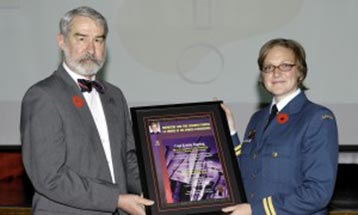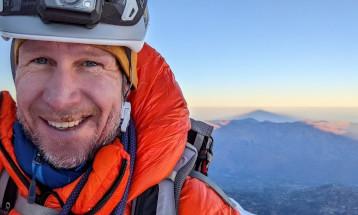Kristin Topping describes her Canadian military career as an engineer as charmed—until her last concussion led her to take a new direction. She shares her experience and advice for all CAF members, from new recruits to those about to release.
Born in southern Alberta and growing up in Sanford, Manitoba, Kristin knew very young that she wanted to attend the Royal Military College of Canada (RMC) in Kingston, Ontario. “I didn’t even apply to other universities,” she says.
Through high school, Kristin worked to build the resume that RMC wanted. She excelled in academics and developed leadership skills in sports, Air Cadets, and Girl Guides. Her only weakness was languages, “There’s not as much opportunity to learn or use French on the prairies,” she says.
Kristin was admitted to RMC and Basic Officer Training in 1998. During the autumns, she ate, slept and breathed rugby, while academics took a back seat. Unfortunately, rugby exacted a price: for Kristin, it was head injuries.
Neither of the head injuries she received were diagnosed as concussions. “These were the days when we were told to ‘shake it off.’ There was a sense then that it was a shame to walk off the field, particularly when an injury wasn’t outwardly visible.” This would end up having major consequences.
Despite lingering concussion symptoms, she graduated with a Bachelor’s degree in Chemical Engineering in 2002. Her first posting was to Defence Research and Development Canada in Toronto. She worked in chemical, biological, radiological and nuclear (CBRN) defence while pursuing her Master’s degree in environmental engineering.
After earning her Master’s, Kristin was posted to the Chemistry and Chemical Engineering Department at RMC as a lecturer. She also volunteered as a coach for the RMC women’s rugby club. “It was the most amazing posting,” she recalls of the five years she taught at RMC while working toward her doctorate in chemical engineering.
Next, Kristin went to the Directorate of CBRN Defence as project manager for developing a sensor integration platform that displays field data in real time. “Canada was the first country in the world to do this,” Kristin says. She worked on several NATO committees in this role. “It was a very, very charmed career.”
Kristin shifted to a completely different role in information management in the Canadian Forces Intelligence Command. “It was empowering to learn that I could do a different kind of job and be good at it.”
In 2016, Kristin suffered a devastating traumatic brain injury (TBI) while off duty. An assessment showed the cumulative effects from previous concussions. Kristin found she could not concentrate, and tasks that once took an afternoon now took days. She also reacted more emotionally. Kristin was posted to the Transition Centre-Ottawa in 2018, to focus on rehabilitation and release.
In 2020, Kristin was medically released. Her two years with the Transition Centre allowed her to find a new way to be successful in life after service.
“The way my brain worked was different after injury,” she says. Kristin decided to start a business based on another passion: rare plants. “I thought, I couldn’t take care of myself, but I could take care of plants.”
She felt that some of the knowledge and skills developed in her career could be useful in business. “Problem solving in project and information management is similar to business problem solving, just on a different scale” she says.
The decision was scary. “I liked the rules and the safety the military provides. Starting a business means leaving that behind.”
As part of her transition, Kristin participated in the Operation Entrepreneur program from the Prince’s Trust Canada in 2018. Right away, she registered her business, Sweetlife Flora, which specializes in exceptional, exotic, hard-to-find indoor plants, as well as other botanical products, services and advice.
She continued with the Prince’s Trust week-long business management “boot camp” in June 2019. One week later, Sweetlife Flora made its first sale.
Launching a new business during the early days of the COVID-19 pandemic seemed risky, but the business has flourished. “The market for rare plants used to be a few hundred hobbyists across Canada. But with so many people at home during the pandemic, interest in rare plants blew up!” Kristin also has over 180,000 followers on social media. This has led to more opportunities.
“My business has done really well so far,” Kristin says. Well enough that she’s splitting it with her sister and moving her half to Nova Scotia with her life partner, Jason Pickering, a CAF Veteran and budding blacksmithing artist. They’re building a new house complete with a greenhouse and a blacksmithing shop.
Kristin hopes her story, captured in the book, Propagated from the Ashes, will help others who are struggling after a TBI or other life-changing injury.
Change in military culture
Kristin welcomes the evolution of the Canadian military culture, especially in attitudes toward injury. “Today, [RMC] grads and serving members are trained to take injury seriously.”
For example, new protocols demand every head injury be assessed immediately on-field, whether in sports, in operations or in day-to-day activities. “If those concussion assessment protocols had been in place when I was injured, my life might be very different.”
Kristin’s tips:
- Work and play within your limitations. Kristin knows how many hours of physical work per week she can do.
- “Treat self-care as preventative health care,” she advises, “and work it into your schedule.”
- For life after service, she advises all CAF members to learn business management. “Veterans come action-packed to be successful in business,” and many of the skills developed in the CAF are transferable to the business world, such as leadership and attention to detail.
The Prince’s Trust Operation Entrepreneur received funding from the Veteran and Family Well-Being Fund.
You can find information on transition services on the Transition page on VAC’s website.





